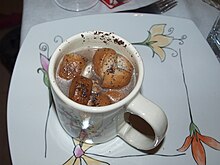Poppy milk (aguonų pienas) is a traditional Lithuanian drink or soup, one of the 12-dish Christmas Eve supper Kūčios. Usually it is eaten together with kūčiukai, another traditional Lithuanian Christmas Eve dish.[1] It is also an ingredient in Kutia, a meal served during a traditional Ukrainian Christmas Eve feast.[2] This drink is considered a dessert.[3]
 Poppy milk with poppy pastries | |
| Country of origin | Lithuania |
|---|---|
| Flavour | Sweet |
| Ingredients | Poppy seeds, water |
Preparation
editTo make poppy milk, one or two glasses of poppy seeds are needed. The poppy seeds are soaked in some hot water for a day or so, changing the water over time, until the seeds become soft. Then the poppy seeds are crushed in a food processor (or traditionally with a pestle in a mortar), until a white liquid comes out. Some cold water is added (preferably water that has been boiled, and cooled), and the poppy seeds are strained and crushed once more. This process is repeated several times in order to get a good poppy milk concentrate. Then, the poppy milk concentrate is diluted with some cold boiled water (the quantity of the water used, is a matter of taste, and certain family preferences, but the flavor of the poppy seeds should be pronounced). Finally, some sugar or honey is added to sweeten the poppy seed milk.[4]
Additional usage
editAlthough traditionally served during the Christmas holiday, in modern times poppy milk has additional uses. It has been suggested as a sleep aid.[5] There is limited information on poppy milk's effects, but studies on poppy seeds have shown promise.[6]
Poppy milk has also been used as a milk substitute.[7][8] Using poppy seed milk as a milk substitute is not a new application,[9] but it is not frequently included in studies of milk alternatives.[10][11]
See also
editReferences
edit- ^ ‘I was so shocked’ Retrieved 12 September 2019
- ^ Goldstein, Darra (November 2002). "Cuisine". Russian Life. 45 (6) – via EbscoHost.
- ^ Countries and their cultures. Ember, Melvin., Ember, Carol R. New York: Macmillan Reference USA. 2001. ISBN 0028649508. OCLC 46319729.
{{cite book}}: CS1 maint: others (link) - ^ "Christmas Eve Recipes and others – Maskoliunas Family Project". Retrieved 2019-09-27.
- ^ Crosby, Heather. (2014-10-28). YumUniverse : infinite possibilities for a gluten-free, plant-powerful, whole-food lifestyle : over 150 recipes. Dallas, TX. ISBN 9781940363592. OCLC 893096290.
{{cite book}}: CS1 maint: location missing publisher (link) - ^ Lemoine, Patrick; Bablon, Jean-Christophe; Da Silva, Christèle (August 2019). "A combination of melatonin, vitamin B6 and medicinal plants in the treatment of mild-to-moderate insomnia: A prospective pilot study". Complementary Therapies in Medicine. 45: 104–108. doi:10.1016/j.ctim.2019.05.024. PMID 31331545. S2CID 181342719.
- ^ Hannah (2019-07-01). "Poppycock". BitterSweet. Retrieved 2019-09-27.
- ^ Yarn, Dana. "All about poppy seed milk… – Named Program". Retrieved 2019-09-27.
- ^ Meakins, Jonathan (1936). The Practice of Medicine. St. Louis: The C. V. Mosby company. p. 1256.
- ^ Sethi, Swati; Tyagi, S. K.; Anurag, Rahul K. (2016-09-01). "Plant-based milk alternatives an emerging segment of functional beverages: a review". Journal of Food Science and Technology. 53 (9): 3408–3423. doi:10.1007/s13197-016-2328-3. ISSN 0975-8402. PMC 5069255. PMID 27777447.
- ^ Chalupa-Krebzdak, Sebastian; Long, Chloe J.; Bohrer, Benjamin M. (December 2018). "Nutrient density and nutritional value of milk and plant-based milk alternatives". International Dairy Journal. 87: 84–92. doi:10.1016/j.idairyj.2018.07.018. S2CID 91497320.